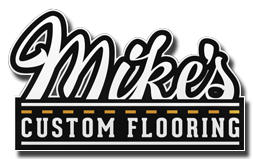Engineered hardwood floors have become a popular choice for homeowners seeking the timeless elegance of hardwood with added durability and versatility. This flooring option blends natural wood aesthetics with modern technology. In this blog post, the experts at Mikes Custom Flooring will explore the pros and cons of engineered hardwood floors to help you make an informed decision for your home.
What is the Advantage of Engineered Wood Flooring?
Aesthetic Appeal: Engineered hardwood floors offer the warmth and beauty of real wood. The top layer, known as the veneer, is crafted from genuine hardwood, providing an authentic appearance that adds value and charm to your space.
Durability: Engineered hardwood is more resistant to moisture and temperature fluctuations compared to solid hardwood. Its multi-layer construction makes it less prone to warping and cupping, making it a suitable choice for areas with varying humidity levels.
Versatility: Engineered hardwood can be installed in various settings, including basements and over concrete slabs, where solid hardwood may not be suitable. Its versatility extends to installation methods, such as glue-down, nail-down, or floating, offering flexibility based on your preferences and the specific requirements of your space.
Environmental Impact: Engineered hardwood often uses less hardwood in its construction compared to solid hardwood, making it a more sustainable choice. Additionally, some products feature eco-friendly adhesives and finishes, further reducing their environmental impact.
Ease of Installation: The installation process is typically quicker and more straightforward than that of solid hardwood. The planks often come with click-and-lock or tongue-and-groove systems, allowing for DIY-friendly installation.
What are the Negatives of Engineered Wood Flooring?
Veneer Thickness: While the top veneer provides an authentic hardwood look, it is not as thick as the solid wood used in traditional hardwood floors. This means that engineered hardwood may have a limited number of sandings and refinishing cycles over its lifespan.
Cost: Engineered hardwood can be more expensive upfront compared to other flooring options, such as laminate or carpet. However, its durability and longevity can offset the initial investment over time.
Scratch Resistance: While engineered hardwood is more resistant to moisture, it may still be susceptible to scratches and dents, especially in high-traffic areas. Choosing a product with a durable topcoat or finish can help mitigate this concern.
Limited Repair Options: Damaged areas may be challenging to repair since engineered hardwood cannot be sanded and refinished as many times as solid hardwood. In cases of severe damage, replacement of the affected planks might be necessary.
Hardwood Floor Installation, Repairs, Refinishing & More in Charles Town & Eastern Panhandle of Berkeley & Jefferson Counties in WV | Winchester & Frederick County | Round Hill & Loudoun County | Berryville & Clarke County | Herndon & Fairfax County VA
Choosing the right flooring for your home involves considering various factors, and engineered hardwood presents a compelling option for those who seek the elegance of hardwood with added practical benefits. Understanding the pros and cons will empower you to make an informed decision based on your preferences, lifestyle, and budget. If in doubt, the professionals at Mikes Custom Flooring have the knowledge and experience to help you in your decision making. They can help you find exactly what works for you and your family’s needs as well as find the custom look you envision. Call Mikes Custom Flooring today to get a free quote and advice.





